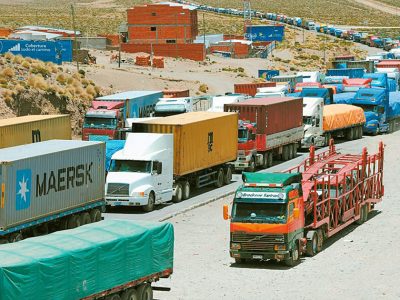In protest of the temporary suspension of exports by the Bolivian Government of some products, national and international heavy transport began this Thursday the blockade of the routes of connection with neighboring countries.
First, the road is closed off in Tambo Quemado, on the border with Chile, informs the president of that sector this Thursday, Alfredo Borja.
He also said that the blockade would be extended to other international highways connecting Brazil, Peru, Argentina, and Paraguay in the coming hours.

The pressure measure follows the declaration of a state of emergency due to the Government’s decision to restrict the export of soybeans, sugar, oil, and beef.
“It directly affects the transportation sector since trucks have products in transit. It also affects exports and the entire production chain,” he said.
So far, according to the executive, some 300 trucks are stuck on the road to Tambo Quemado.
The business sector, through the Confederation of Private Businessmen of Bolivia (CEPB), the Chamber of Exporters, Logistics and Investment Promotion of Santa Cruz (CADEX), and the National Chamber of Oilseed Industries of Bolivia (CANIOB) rejected the measure suspending exports.
CEPB issued a statement describing the measure as unfair and said that this situation only jeopardizes the sustainability of labor sources and investments.
The president of CADEX, Oswaldo Barriga, stated that the measure is inadequate and does not respond to the prevention of supplying the domestic market.
The president of CANIOB, Jorge Amantegui, also rejected the measure and stated that it is not really that there is a shortage in the domestic market because of the national production of soybean and its derivatives; 20 percent covers the national demand.
The remaining 80 percent goes to international markets as exports.
Meanwhile, the Minister of Productive Development and Plural Economy, Néstor Huanca, justified that the temporary suspension of exports is aimed at “safeguarding food security” until normal supply conditions are restored to the population.
He regretted that in six days of civic strike in the department of Santa Cruz (east) that affects the population, the business sector has not spoken out, and only when there was a suspension of some food exports did they issue their rejection.

